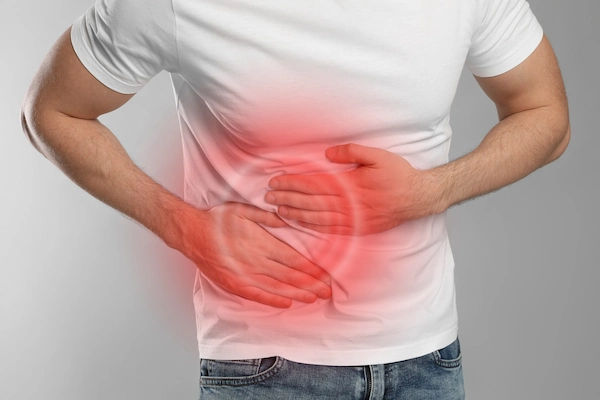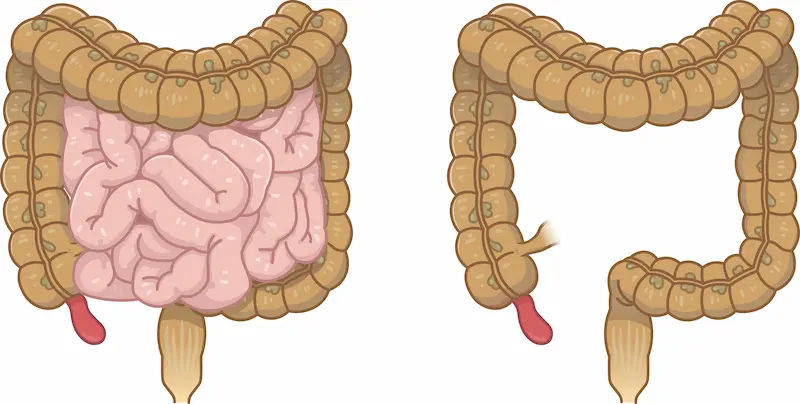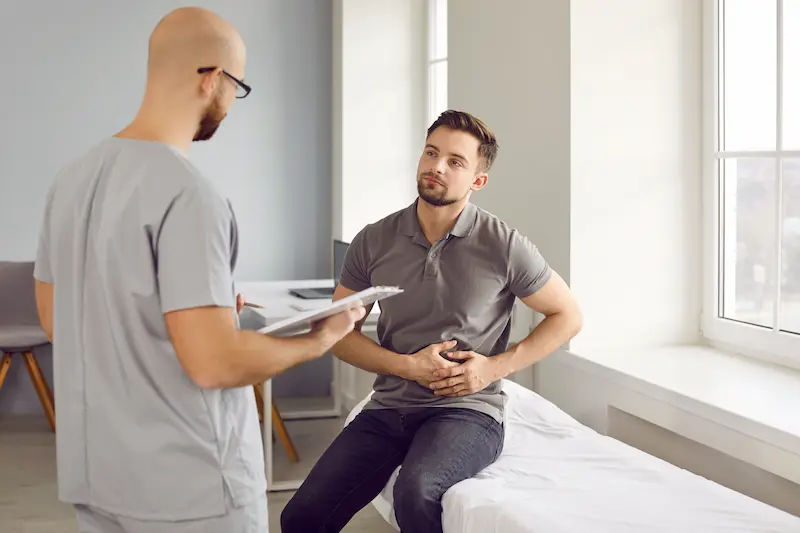Appendicitis Signs
Early detection of appendicitis signs can ensure prompt surgery and medications. Awareness can prevent life-threatening situations. Know the early signs and symptoms and treatment methods for fast recovery.


Appendicitis refers to the inflammation of the appendix, which is a small pouch-like structure attached at the right side of the abdomen between the small and large intestine. The inflammation can cause severe pain in the lower right abdomen. This condition often arises when a blockage or infection causes the appendix to swell.
If left untreated, the swelling can lead to a rupture. This can spread bacteria into the abdominal cavity and, in turn, cause peritonitis or sepsis (the body’s improper reaction to infection). Understanding the signs of appendicitis is important as it can aid in timely diagnosis and treatment.
This article provides an in-depth look at appendicitis, exploring its causes, symptoms, and treatment options.
Causes and Risk Factors
While the most accurate causes of appendicitis might not always be clear, here are a few factors that may cause the condition-
1. Common causes of appendicitis
Foreign objects: Sometimes, foreign objects accidentally swallowed may get stuck in the appendix. This can cause a blockage.
Infections: Infections in the digestive system can also irritate and inflame the appendix.
Hardened stool (Fecaliths): One of the most common causes of appendicitis is fecaliths. These are hardened stool deposits that block the opening of the appendix, potentially causing inflammation.
Enlarged lymph nodes: Infections in other parts of the body can cause lymph nodes near the appendix to swell, too, leading to a blockage.
2. Risk factors associated with appendicitis
Age: Appendicitis occurs most often in people aged 10 to 30. Knowing this can help identify those at greater risk.
Gender: While appendicitis can affect anyone, it is slightly more common in males.
Family history: If close family members have had appendicitis, the chances of developing it are higher.
Previous abdominal surgery: A history of abdominal surgery may increase the risk due to scar tissue or adhesions affecting the appendix.
Recognising the Symptoms
Appendicitis can cause a range of symptoms, including:
Abdominal pain
Low fever
Nausea
Gastric concerns
Vomiting
Lost appetite
Constipation
Diarrhoea
While there is a typical pattern for these symptoms, not everyone experiences them in the same way. About half of those with appendicitis don’t have the classic set of symptoms. Children, older adults, and pregnant individuals may show atypical symptoms, making it harder to identify the condition.
Get Your Appendicitis Symptoms Checked
Diagnostic Procedures
To diagnose appendicitis, a healthcare provider will typically review symptoms and perform a physical exam.
Physical Exam: The provider may gently press on the painful area of the abdomen. When the pressure is released, the pain often worsens, which is a sign of inflammation in the peritoneum ( abdominal lining ). They may also check for abdominal stiffness and muscle guarding, which occurs when the muscles tighten in response to pressure on the inflamed appendix.
Blood Test: A blood test can help assess white blood cell count, which may indicate an infection if high.
Urine Test: A urinalysis may be done to rule out a urinary tract infection (UTI) or kidney stones as the potential source of the pain.
Imaging Tests: Imaging tests can help confirm appendicitis or uncover other potential causes. These may include an abdominal X-ray, ultrasound, CT scan, or MRI.
Treatment Options
The primary treatment for appendicitis is surgery to remove the appendix, called an appendectomy. Since the appendix is not essential for bodily functions, removing it does not cause harm.
In most cases, surgery is performed as soon as possible, although there may be a brief wait before the procedure. The surgery typically lasts about an hour.
The main steps of an appendectomy are:
The patient will be given a general anaesthetic to ensure they are asleep and pain-free during the procedure.
The surgeon will make small incisions in the abdomen and use a thin tube with a camera to view the appendix. This is known as keyhole surgery. In some cases, a larger incision may be made on the lower right side of the abdomen if open surgery is needed.
The surgeon removes the appendix by cutting it free from the bowel. If the appendix has burst, the surrounding area will be cleaned to prevent infection.
The abdomen is closed using stitches, clips, or surgical glue.
Complications of Appendicitis
A burst appendix, also known as a perforated or ruptured appendix, can lead to serious complications, including:
Peritonitis: An infection of the inner lining of the abdomen.
Sepsis: A life-threatening reaction to infection that can spread throughout the body.
Abscess: A painful build-up of pus.
Bowel Blockage: A blockage in the intestines, which can cause additional issues.
Pregnancy Issues: Complications that may affect pregnancy.
Recovery and Aftercare
Recovery after an appendectomy can vary based on how inflamed the appendix was, whether there were complications, and how the body responds to surgery.
Most side effects typically improve within a few days, but it may take several weeks to return to regular activities. Many people can resume work or school within one to three weeks or up to a month if they have open surgery. Full recovery generally takes about six weeks.
Here are some helpful guidelines for recovery:
Keep the incision(s) clean and dry: This helps prevent infection.
Start with soft foods: Gradually transition to solid foods as the digestive system adjusts.
Limit physical activity: Abdominal muscles may ache, especially after open surgery, so avoid prolonged standing or strenuous tasks.
Monitor for warning signs: Contact a healthcare provider if there are symptoms like fever or pus near the incision(s).
Prevention and Early Detection
While it may not be possible to completely prevent appendicitis, adopting healthy dietary choices and habits can be beneficial for overall digestive health.
A fibre-rich diet is often recommended, as it may reduce the likelihood of developing appendicitis. Consider adding the following to your meals:
Oats or wheat germ: Use these as a nutritious alternative to sugary breakfast cereals.
Whole wheat flour: Replace all-purpose flour with whole wheat in your recipes.
Brown rice: Opt for brown rice instead of white rice for added fibre.
Fresh fruits: Choose fruits for dessert to increase your fibre intake naturally.
An inflamed appendix can rupture, allowing bacteria to spread throughout the body and cause a severe, potentially life-threatening infection called peritonitis. Recognising the early signs of appendicitis can help ensure timely diagnosis and treatment and prevent any life-threatening situations.
Conclusion
Appendicitis is a condition that requires prompt attention to avoid serious complications. Understanding its causes, symptoms, and treatment options can make a significant difference in ensuring timely medical intervention.
By recognising early warning signs, adopting healthy dietary habits, and seeking professional care when needed, individuals can reduce risks and improve outcomes. Awareness and proactive care remain key in managing this potentially life-threatening condition, empowering individuals to take control of their health and well-being.
Consult Top Gastroenterologist
Get Your Appendicitis Symptoms Checked

Dr. Chethan T L
General Physician/ Internal Medicine Specialist
5 Years • MBBS, MD, DNB (General Medicine)
Bengaluru
Apollo Medical Center, Marathahalli, Bengaluru

Dr Bhargav Vuppumalla
General Physician/ Internal Medicine Specialist
5 Years • MBBS MD GENERAL MEDICINE
Bengaluru
Apollo Medical Center, Marathahalli, Bengaluru

Dr. Nikhil Patil
Gastroenterology/gi Medicine Specialist
10 Years • MBBS
Bengaluru
Apollo Medical Center, Marathahalli, Bengaluru

Dr Sravani Kuppam
General Physician/ Internal Medicine Specialist
12 Years • MBBS DNB General Medicine, CCDM (Diabetes)
Bengaluru
Apollo Medical Center, Marathahalli, Bengaluru

Dr. Jatin Yegurla
Gastroenterology/gi Medicine Specialist
11 Years • MD (PGI), DM (AIIMS Delhi), FAGIE (AIIMS Delhi), ESEGH (UK), Gold Medalist
Hyderabad
Apollo Hospitals Jubilee Hills, Hyderabad
(675+ Patients)
Consult Top Gastroenterologist

Dr. Chethan T L
General Physician/ Internal Medicine Specialist
5 Years • MBBS, MD, DNB (General Medicine)
Bengaluru
Apollo Medical Center, Marathahalli, Bengaluru

Dr Bhargav Vuppumalla
General Physician/ Internal Medicine Specialist
5 Years • MBBS MD GENERAL MEDICINE
Bengaluru
Apollo Medical Center, Marathahalli, Bengaluru

Dr. Nikhil Patil
Gastroenterology/gi Medicine Specialist
10 Years • MBBS
Bengaluru
Apollo Medical Center, Marathahalli, Bengaluru

Dr Sravani Kuppam
General Physician/ Internal Medicine Specialist
12 Years • MBBS DNB General Medicine, CCDM (Diabetes)
Bengaluru
Apollo Medical Center, Marathahalli, Bengaluru

Dr. Jatin Yegurla
Gastroenterology/gi Medicine Specialist
11 Years • MD (PGI), DM (AIIMS Delhi), FAGIE (AIIMS Delhi), ESEGH (UK), Gold Medalist
Hyderabad
Apollo Hospitals Jubilee Hills, Hyderabad
(675+ Patients)
.webp)



